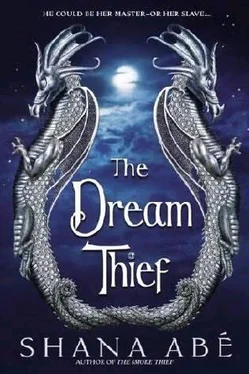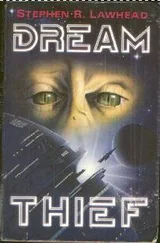“I dislike this scheme. Intensely,” he added when her smile only deepened.
“I failed to hear you devise a better one.”
“Actually, I did.”
“We cannot both go,” argued his wife, reasonable. “We cannot both vanish without word for months on end, no matter how urgent the cause. The entire tribe would be in an uproar. The council would have our heads.”
“That is why-”
“And if it were to be only one of us, you know it should be me. I’m the one with the most experience at stealing away.”
“If you think for a moment I would let you travel alone-”
“No,” said Rue. “I didn’t think that.”
It was a delicate subject, one he didn’t feel like exploring at the moment. But her eyes had grown stormy; to distract her, he bent down and pressed his lips to her temple.
“Imagine how lonely I’d be without you,” he murmured. “Tottering around, a doddering old man weeping into his shirtsleeves…”
It earned him a laugh, low and musical. “You’re far too vain for that. You’d use a handkerchief.”
He folded her into his arms. They were silent a long while, her head against his chest, rocking slowly together as the clouds outside lapped vanilla cream against the horizon. Finally Rue sighed.
“It can’t be either of us. It can’t be any of us. We can’t risk it. The lure of the song is fearsome enough at this distance. Even the elders agreed it could be irresistible up close. Whoever has that diamond now might understand its power. Might realize what we are and use it against us. That’s why it must be Zane. He won’t be susceptible to the song, and he won’t think twice about handing it over to us once he has it. Especially since he doesn’t know what it can do.”
“Unless someone sees fit to tell him. What then, little mouse?”
She stilled a moment, then tipped back her head to see him.
“He’s still our best hope.”
“Aye,” agreed Kit reluctantly. “I know it.”
Their gazes locked. The heat began to build, that deep, burning craving for her, for her body and her voice and her heart.
Rue’s lashes lowered, very demure. He felt her fingers tighten over his arms.
“Will you come to bed, my lord Langford?”
It was barely past teatime. Neither of them cared.

Paris was wet, a cold, gray city with even grayer people, the scent of decaying vegetables and clay and cattle everywhere. The sky remained leaden all the way from Avon to Strasbourg, but it didn’t truly start to snow until he reached Stuttgart, when the raw winds tore through the clouds to embed a layer of ice crystals upon his rented coach, and the road, and his coat and the gloves on his hands: every inch of the world glistening with a sly, glassy enchantment beneath the weakened sun.
The horses struggled with the frozen muck. Zane had been riding atop the diligence until then, squeezed into the driver’s perch alongside the German coachman until the cold seared his eyeballs and bit his skin to frost. He had never cared for the cramped interiors of carriages, no matter how stylishly done up. He needed the open sky, and open views.
But the horses suffered. So they traveled a great deal more slowly than he would have liked otherwise, stopping at inns, at taverns, even farmhouses, whenever the weather grew too dismal. He became used to the round-eyed looks of the country ostlers, their noses red with the wind, as the sleek new coach rolled into whichever godforsaken village arched next into view along the roads. He became used to the smell of hay mixed with sludge, and the shiny wet gloss of melted snow tracing lines along the black spokes of the wheels.
The entire rig had cost a great deal to rent. Few companies wished to hire out as far as he was going, and fewer still drivers. But hard gold always managed it; the Paris company had found a fellow with cousins in Munich. He would get that far before starting over again.
Strapped to the back of the carriage was a single trunk holding his garments and shoes and a very decent bottle of sherry. Inside the carriage were the more valuable things: his picks, his spare pistol, and bullets and powder horn. Three daggers, a dirk, and a single sheath of rice paper, tucked thin and small into the lining of his valise.
In Rue’s neat, slanted writing, the paper read:
Pest
Oradea
Satu Mare
Carpathian range? No farther.
No more than twelve carats, no less than one-half; a cast of blue; uncut. Heavy in the hand.
Draughmurh? Drawmur? Drahmer?
It was precious little to go on. It was precious little to tie up his life and his establishment for an entire season, no matter how competent his associates or how satisfying his reputation. There had been nights he lay awake in the lice-ridden pallets that passed for beds in most hotels when he’d wondered when, precisely, he had lost his reason. There could be no other answer to this journey. Rue’s imploring eyes and careful lies be damned: he had no true idea of where he was going. He had nearly nothing to go on, guesses and dream-work from a clan of creatures who could answer only, It sings and It calls and You must bring it back to us when he asked for clearer directions.
Merde.
Too often he’d just settle back against the squabs and watch his boots drip. He’d been traveling over a month now, well versed in his guise as an English gentleman on the Grand Tour. He’d patronized so many tea parlors and coffeehouses and card rooms that the mere thought of downing another cup of tepid liquid amid the chatter of foreign tongues made his skin crawl.
He spoke French well, German tolerably. After that, he was no better off than the role he played, a bored English sophisticate with a taste for legends and gemstones.
The land passed by his window in depressing sameness. France, Germany, Austria: all gray and dun and somber skies.
Sixty thousand pounds.
He’d buy a castle in Tuscany. There’d be no bloody ice there.

Despite fresh horses and his new coachman’s best efforts, they could not cross the Danube to reach the city of Pest before the sun sank into a thick red and purple horizon, ending the final day of October. Zane settled for Óbuda instead, across the river, smaller, and, from what he could tell, slightly more stylish. The Hungarians here sported wigs and buckled heels he had last seen in the heart of Paris. The women were hooded and painted and walked the cobblestone streets in dainty, mincing steps, never far from their escorts. He’d garnered more than a few glances just checking in to the hotel-scruffy, unshaven, his trunk and greatcoat spattered with mud. The King’s View was a veritable palace of plasterwork and imposing marble angels, but after three straight days without a good night’s sleep, Zane reckoned the Marquess of Langford could afford it.
From his balcony he watched the skyline begin to illuminate, yellow flames that gradually connected into pictures through the dusk, outlining buildings and steeples and streets, the indigo emptiness of parks checkerboarding the glow. Pest glimmered and the river glimmered with it, its banks edged silvery white with the last dusting of snow.
The Danube was a wide, gray line between the two cities, dotted with fishing boats and ferries and great flocks of crows; their high-pitched cackles bounced back at him across the waves.
The balcony curtains swelled and folded, gently tapping his legs. The breeze lifted his hair. He’d already undone his waistcoat and settled in with his sherry to watch the birds when the floorboards outside his room squeaked, and stopped, because someone had paused at his door.
Читать дальше








![Theresa Cheung - The Dream Dictionary from A to Z [Revised edition]](/books/618735/theresa-cheung-the-dream-dictionary-from-a-to-z-r-thumb.webp)
![Theresa Cheung - The Dream Dictionary from A to Z [Revised edition] - The Ultimate A–Z to Interpret the Secrets of Your Dreams](/books/692092/theresa-cheung-the-dream-dictionary-from-a-to-z-r-thumb.webp)




